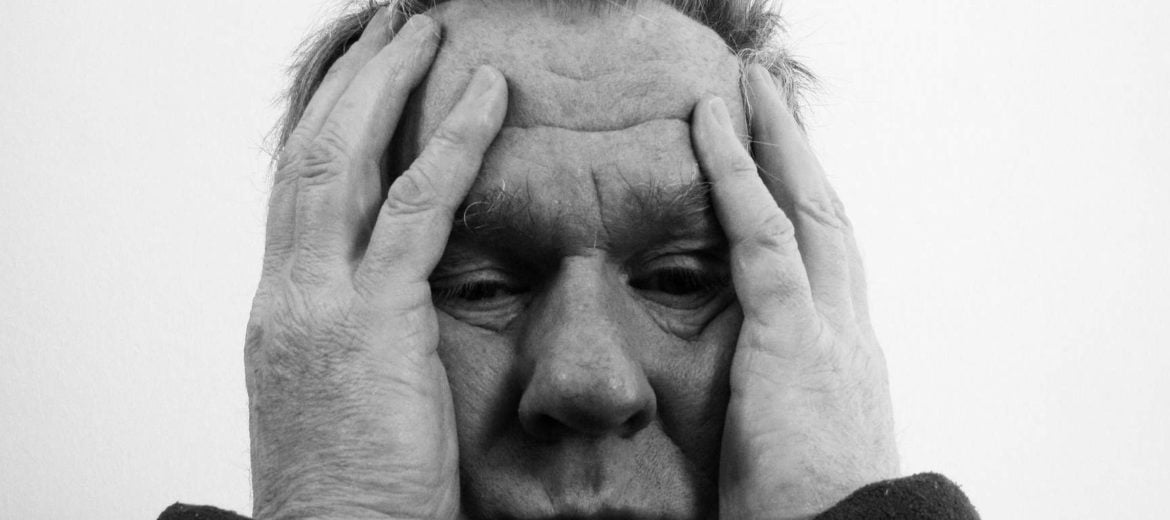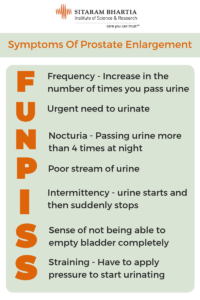- Prostate Enlargement – How is it diagnosed?
- What is Prostate Enlargement?
- Symptoms of Prostate Enlargement
- What causes the prostate to enlarge?
- Can prostate enlargement be cured?
- Surgery For Enlarged Prostate
- Enlarged Prostate – Dietary Changes
Benign Prostatic Hyperplasia, meaning prostate enlargement in layman’s terms, affects almost 1 out of 2 men above the age of 50.
Gaurav Sinha (57), however, didn’t have any clue about it until he started noticing a change in his urinary pattern.
“It has been a month since I started waking up almost 5 to 6 times at night with an urgent need to urinate. Even though my bladder felt full, I faced difficulty in passing urine,” Gaurav shared.
“Despite frequent trips to the washroom, I was unable to empty my bladder completely which added to my discomfort.”
The situation got worse when one day he was unable to pass urine at all. He just could not urinate despite repeatedly visiting the toilet and straining himself. Within 3 to 4 hours he developed excruciating pain in his lower abdomen as his bladder bloated due to the stored urine.
He rushed to Sitaram Bhartia Hospital in South Delhi where he met Dr. Mayank Uppal.
Prostate Enlargement – How is it diagnosed?
On listening to Gaurav’s symptoms and keeping his age in mind, Dr. Mayank suspected an enlarged prostate and decided to carry out a Digital Rectal Examination (DRE) to physically check if his prostate had increased in size. He discovered a moderate enlargement in performing DRE.
He then advised Gaurav to get an ultrasound of the kidneys, ureter, bladder, and prostate. The prostate size on ultrasound was found to be 52cc where the normal size of prostate is around 30 cc.
“In patients who present early with difficulty in passing urine we also measure the post-void residual urine volume (amount of urine left in the bladder after urination) and conduct a uroflowmetry to measure the flow and force of the urinary stream,” said Dr. Mayank.
For a proper diagnosis, Prostate-Specific Antigen (PSA) blood test was also conducted. PSA is a substance produced in your prostate. PSA levels increase when the prostate gland enlarges. Abnormally high levels raise the suspicion of prostate cancer. Kidney function tests were also done to document any damage to the kidneys and a urine culture to rule out any infection.
All the test results revealed that Gaurav indeed had an enlarged prostate gland without any kidney damage.
Prostate Enlargement Meaning – What Is An Enlarged Prostate?
The prostate is a walnut-shaped gland situated at the base of your bladder surrounding the urethra (tube transporting urine from the bladder out of the penis) and is responsible for making the fluid that goes into the semen.
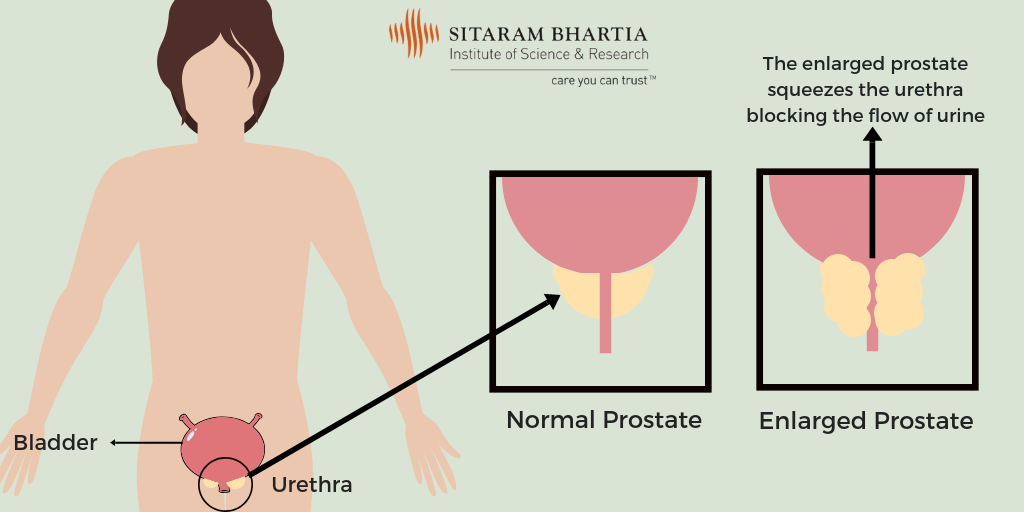
“Prostate gland grows throughout the life of a man but when it becomes very enlarged, it starts putting pressure on the urethra and blocks the flow of urine” explained Dr. Mayank.
The symptoms of enlarged prostate include:
- Increase in the number of times you pass urine
- Urgent need to urinate
- Passing urine more than 4 times at night (Nocturia)
- Poor stream of urine
- Urine starts and then suddenly stops (Intermittency)
- Sense of not being able to empty the bladder completely
- Straining – Have to apply pressure to start urinating
What is the main cause of prostate enlargement?
“Studies have shown that the prostate gland grows due to hormonal changes that take place with age. Testosterone levels have shown some correlation and could cause enlarged prostate as well.
Gaurav had heard about prostate cancer and asked Dr. Mayank – “Does enlarged prostate mean cancer?”
“ A common fear related to BPH is that prostate enlargement means an increase in chances of developing prostate cancer — this is not true at all! ” clarified Dr. Mayank.
After Gaurav fully understood his condition, he was ready to discuss the treatment with the doctor.
Prostate Enlargement Treatment – Can an enlarged prostate be cured?
There are different methods for prostate enlargement treatment but it all depends on the symptoms of the person, his age and the size of prostate.
What is the best treatment for an enlarged prostate?
When a person shows only mild to moderate symptoms without any complications, doctors often advise medication as enlarged prostate treatment. But if he shows severe symptoms, enlarged prostate surgery becomes essential.
“Is an enlarged prostate serious?” wondered Gaurav, worried about his condition.
“Surgery becomes essential when you delay prostate enlargement treatment and unnecessary complications develop,” warned Dr. Mayank.
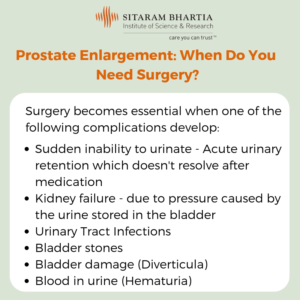
- Sudden inability to urinate – Acute urinary retention which doesn’t resolve after the medication
- Kidney failure – due to pressure caused by the urine stored in the bladder
- Urinary Tract Infections
- Bladder stones
- Bladder damage (diverticula)
- Blood in the urine (hematuria)
Since Gaurav’s prostate was quite enlarged and he had lost his ability to urinate, he had to start with a catheter (thin tube) which was inserted inside his urethra and into the bladder to pass all the urine stored in it.
He was prescribed a medication called 5-alpha blocker and was asked to come back after 2 weeks.
After 2 weeks when the catheter was removed, Gaurav was asked to try passing urine again.
When he was still unable to do so, Dr. Mayank advised him to go for a minimally invasive surgery known as Transurethral Resection of Prostate (TURP) instead.
Alarmed at the mention of surgery, Gaurav asked many questions about how it would be performed and about post-operative care.
Enlarged Prostate Surgery
“In TURP, a surgical instrument called a resectoscope is inserted through the tip of your penis and into the urethra. The resectoscope is then used to scrape away excess of the prostate gland which is blocking the urine flow,” explained Dr. Mayank.
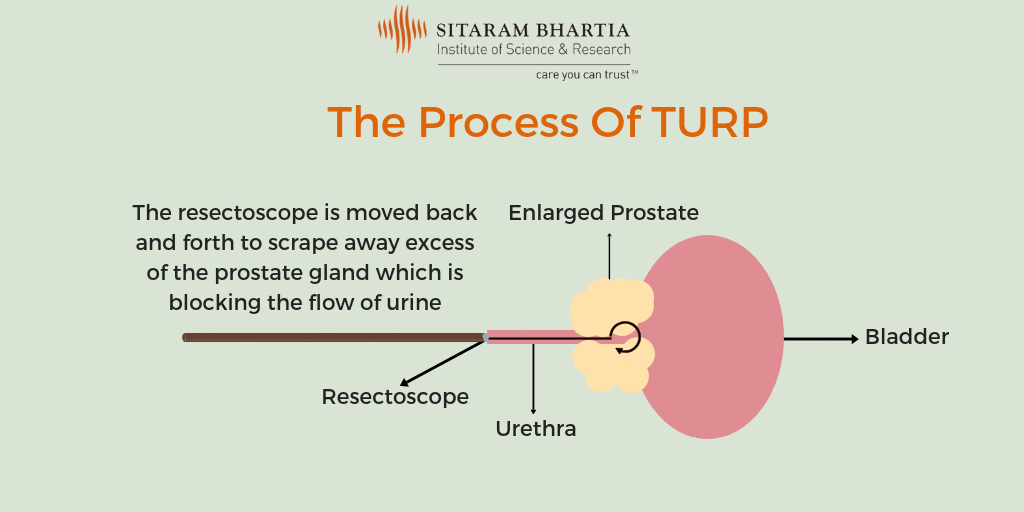
Holmium Laser Prostate Surgery or Holmium Laser Enucleation of the Prostate (HoLEP) is another minimally invasive treatment option for men with enlarged prostate.
This procedure uses laser to entirely remove the prostate tissue that is blocking the urine flow without making any cuts.
After understanding in detail surgery for BPH, Gaurav was concerned about TURP surgery cost.
Prostate surgery cost in Delhi ranges between Rs 80,000 in small nursing homes of Delhi to Rs 2,50,000 in large corporate hospitals. At Sitaram Bhartia, we work towards providing high-quality healthcare services at affordable rates. We offer a free initial consultation with our surgeons and then work to come up with a cost that is feasible for the patient.
Call us at +919871001458 for an estimate for TURP surgery.
What is the recovery time after enlarged prostate surgery?
In most cases, you can be discharged after 3-5 days of the surgery. You will be advised not to indulge in any physical exercise or lift heavy things for a few weeks.
“You should also avoid traveling in buses and other public transport where there is a chance of getting pushed around.”
Gaurav discussed all the details of the surgery with his wife and together they scheduled the surgery.
His surgery went well.
In the follow-up consultation, he asked about what can be done to control the symptoms of an enlarged prostate at home so that he could advise his friends and family about the condition.
Recommendations for Enlarged Prostate Diet
“What foods should you avoid if you have an enlarged prostate?” asked Gaurav.
“I don’t prefer to restrict my patients in terms of diet but anything in excess is not good,” remarked Dr. Mayank.
You could make the following dietary changes to control your symptoms better:
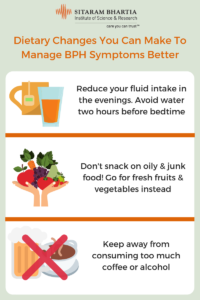
-
- Limit your liquid intake in the evenings: Avoid drinking lots of water in the evenings. It would be better to not drink anything for at least two hours before bedtime. This will help you reduce your trips to the washroom at night.
-
- Have a healthy meal every day: Avoid oily and junk food as it can cause obesity. Obesity increases chances of having an enlarged prostate. Eat lots of fresh fruits and vegetables daily. Also try to limit your intake of red meat like beef, pork, and lamb. Choose healthier sources of protein like fish and eggs.
- Avoid caffeine and alcohol: These can increase urine production and worsen the symptoms. Alcohol causes prostatic congestion and can increase the chances of urine retention in borderline cases.
- Have a healthy meal every day: Avoid oily and junk food as it can cause obesity. Obesity increases chances of having an enlarged prostate. Eat lots of fresh fruits and vegetables daily. Also try to limit your intake of red meat like beef, pork, and lamb. Choose healthier sources of protein like fish and eggs.
“Thankfully I feel a lot better after the surgery. Now I know the importance of treating prostate enlargement early,” remarked Gaurav.
“I will advise all my friends to go for a prostate check-up so they can get treated if needed before complications arise as they did in my case,” said Gaurav.
This post was written in 2018 and has been medically reviewed by Dr. Mayank Uppal, MBBS, GSVM Medical College, Kanpur (2006); DNB (Medicine) -VMMC & Safdarjung Hospital, New Delhi (2011).
Are you suffering from prostate problems? Fill in the form below to request a consultation with our prostate experts!
Book an Appointment with either of our doctors:

Dr. S.V. Kotwal, Senior Consultant, Urology
Experience: 39+ years
Consultation fees: Rs 1200

Dr. Mayank Uppal, Consultant, Internal Medicine
Experience: 10 years
Consultation fees: Rs 1100

